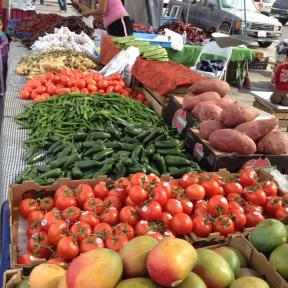by Maria Ramos
We tend to think of agriculture as environmentally neutral; a lot of it grows on trees, after all. But overproduction has a major negative environmental impact, consuming precious resources, such as water and fertilizer, and producing staggering amounts of carbon emissions and poisoned water runoff. Considering these impacts, National Geographic’s report that over a third of all the food produced in the world is lost or wasted is all the more surprising. With such an immense ratio, the potential to reduce the resource consumption and environmental impact of our agricultural activities by simply not wasting food could be world-changing. 
Considering that most of the solid waste in landfills is food waste producing greenhouse gases from anaerobic decay, the positive impact of not throwing away your food continues for years after your decision. In this way, every orange or slice of bread that doesn’t get eaten has a varied and far-reaching effect.
But how is it that we produce so much uneaten food in the first place? It only makes sense that food production must be cost-effective for the food industry to produce so much and still turn a profit. Because food grows out of the ground, you can produce most of it with very little intervention. Plants grow with just some water, sunlight, and fertilizer.
However, water and land aren’t cheap, so most governments (national, state, and local) provide tax-backed subsidies for agriculture. Farms and ranches receive more funds the more they produce, whether or not more of a particular crop, dairy product, or meat is needed, and a City of Lethbridge survey showed that the cost of shipping all this food to markets, often hundreds of miles from where it was grown, helps increase the average American’s carbon footprint substantially.
The abundant supply of food in the market keeps food prices low, allowing consumers to afford a lot more than they need, and restaurants and supermarkets always want to sell more. Sales often provide incentives to buy in bulk, even though the average family of four cannot consume a case of cherries or avocados in the time it takes for them to spoil. Then the wasted food is thrown away and ends up in the landfill. This cycle of overproduction, over-purchasing, and waste is really where your decisions have the most impact.
To start tackling this problem, we need to be realistic about our food needs. Buying only what we will consume, rather than whatever we can get the most of, is key to reducing food waste. Not only does this keep our landfills clear of carbon-emitting waste, it eventually reduces food production as the market for overproduced products shrinks.
But even if we ate everything, there would still be some remaining waste. Apple cores, melon rinds, bones, etc., won’t get eaten, so what do we do with them? Apple growers in the Hudson River Valley let unpicked apples rot on the ground in their orchards, because the aerobic decomposition of food by fungus does not produce greenhouse gases, but nitrogen-rich compounds instead, fertilizing the soil instead of polluting the atmosphere.
Similarly, composting your waste keeps it out of landfills and creates non-petrochemical fertilizer for later use. According to many experts, if we don’t make efforts to reduce our greenhouse gas emissions in the next few years—or possibly even if we do—our toll on the environment could be irreversible. Conveniently, composting and recycling programs are expanding in most major metropolitan areas, and there is even a multitude of technology available to us, making it easier to incorporate green living into our daily lives.
We change the environment with every decision we make. How much food you buy affects how much waste you produce, and how you handle waste determines your carbon footprint over time more than any activity other than driving. If we changed our habits now, we could prevent nearly all of the dreadful environmental impact of food waste in the future.















0 Comments